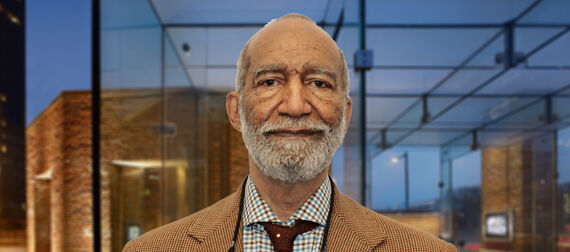The Divine Lorraine Hotel, an eye-catching landmark towering above North Broad Street, is a familiar sight for the thousands who travel along the bustling thoroughfare. Far fewer, though, are aware of the Divine Tracy Hotel, the Lorraine's little sister, located on the other side of town.
Smaller and more low-key, the Divine Tracy is an eerily tranquil hotel home to both short- and long-term guests. The immaculate facility, which services clientele from around the world, sits at the intersection of 36th and Sansom streets, in the heart of West Philadelphia's University of Pennsylvania campus.
Like the Lorraine, the Tracy Hotel, which opened in 1950, was one of the only lodgings in Philadelphia offering firstclass accommodations to African-Americans at affordable prices. Today, for a mere $50 per night, the Tracy is still considered one of the best deals in town -- that is, if you can abide by the establishment's rigorous rules and regulations.
Part of a strict Christian belief system known as the Peace Mission Movement, the Divine Tracy was the brainchild of the Rev. Major Jealous Divine, better known as Father Divine.
Renowned for the unorthodox ways in which he solicited support from his congregation, Divine’s notoriety skyrocketed in 1931. After Divine was arrested in New York City for disturbing the peace, the hale 55-year-old judge who imposed Divine’s jail sentence dropped dead a few days later. When journalists interviewed Divine about the judge’s untimely death, he said, "I hated to do it."
Today, in keeping with the organization’s original tenets of obedience, modesty and chastity, Tracy guests must abide by the hotel’s peculiar regulations: no smoking, alcohol or food in the rooms; no vulgarity, obscenity or blasphemy; men and women reside on separate floors, allowed to commingle only in the hotel lobby; women must wear stockings and are not allowed to dress in slacks, shorts or miniskirts; and men cannot wear sleeveless tops, have untucked shirts or go without socks.
"We take our time to explain things to our guests because we are different," explains Addie Spaulding, the hotel comanager. A woman in her 70s, Spaulding says she joined the Peace Mission Movement as a child. Calm, impeccably dressed and neatly coiffed, she says that, for her, this is God’s work.
"The majority of people who come here have already heard about our standards, and they’re attracted to us because they know who we are," she says. "They know that we could not maintain a wholesome, safe and secure atmosphere otherwise."
Founded in 1914, the Peace Mission was widely regarded as a cult movement. Seen as a flashy, arrogant preacher, Divine was a folk hero in the black community for his stands against racism. Despite preaching the mandates of celibacy, he married twice, though each was regarded as a spiritual, rather than physical, marriage. His second wife, a white Canadian known as Mother Divine, still lives on their 73-acre estate in Gladwyne, now a national historic landmark. Father Divine, who died in 1965, is enshrined on the grounds.
Today, the Divine Tracy is one of the few vestiges of the movement still left in Philadelphia. In its heyday, the organization had real estate and business investments valued at $12 million. One by one, though, each entity was relinquished. In 2000, the Lorraine was sold to developer Tony Goldman, but remained vacant. Last year, the 699 North Broad Street Association purchased it for nearly $2.3 million, and the new owners reportedly are considering turning the property into condominiums.
But at the Divine Tracy, business is thriving. Staffed by volunteers who, as members of the congregation, also live on the premises, the hotel’s occupancy rate is usually at 85 percent. Even with more reputable lodging nearby, such as the Sheraton, the Inn at Penn and Penn Towers, it’s still the best bargain around.
"The hotel is very helpful for foreign students, visiting professors and laymen visiting the area who can’t afford the higher rates at other hotels," Spaulding says. "We also accommodate the University of Pennsylvania hospital, providing accommodations for the relatives and friends of patients, so they can stay nearby."
The hotel’s decor is distinctly Americana. Bald eagles and U.S. flags are displayed throughout, along with a number of sepia-toned photos of Father and Mother Divine, which even grace the elevators. Spacious rooms are furnished with well-preserved antiques and laden with kitschy porcelain figurines. Some even offer perfect views of Center City’s skyline.
For the past three summers, participants in a workshop affiliated with Penn’s School of Nursing have boarded at the Tracy.
"When I send people their acceptance letters, as a housing option I include a brochure from the Tracy with their rules and regulations," says Susanna Kramer, administrative coordinator for the program. "They usually don’t mind the rules, and the separation between men and women is not a big deal either, because they’re usually traveling alone. It’s very inexpensive and very clean. And the staff, they’re really wonderful: very pleasant, friendly and professional." For some Philadelphia historians, the Divine Tracy Hotel is legendary.
"A lot of people know about the Lorraine, but hardly anyone knows about the Tracy," says Charles Blockson, curator of the Charles L. Blockson Afro-American Collection at Temple University. "For any place to survive this long really says a lot. And no matter what anybody says about Father Divine, around here his legacy still prevails."


